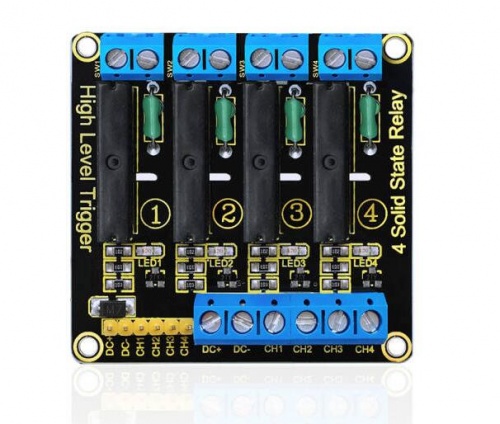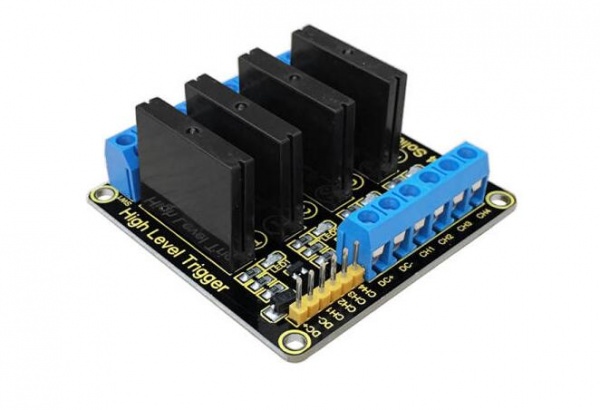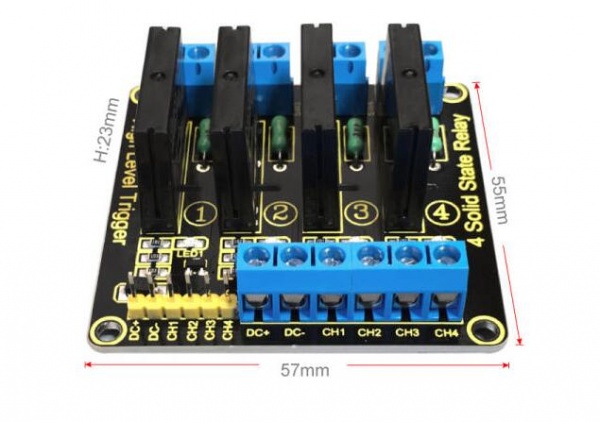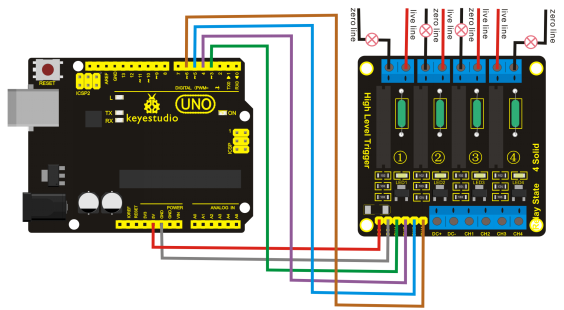Ks0265 keyestudio Four-channel Solid State Relay Module: Difference between revisions
Keyestudio (talk | contribs) (→Result) |
Keyestudio (talk | contribs) |
||
| (11 intermediate revisions by the same user not shown) | |||
| Line 1: | Line 1: | ||
<br> | |||
==Keyestudio Four-channel Solid State Relay Module== | ==Keyestudio Four-channel Solid State Relay Module== | ||
<br>[[File:KS0265-.jpg|500px|frameless|thumb]]<br> | <br>[[File:KS0265-.jpg|500px|frameless|thumb]]<br> | ||
<br> | |||
==Introduction== | ==Introduction== | ||
Keyestudio four-channel solid state relay is '''active at HIGH''' level, that is to say, the input control signal is the low level (0-2.5 V), the relay is off; while the input control signal is high level (3.3-5 V), the relay is on. <br> | |||
Solid State Relay is a new kind of contactless switching device, which is composed of all solid state electronic components. <br> | |||
Compared with the electromagnetic relay, it has higher reliability, with the features of non-contact, long service life, fast speed and less outside interference. <br> | |||
< | <span style=color:red> The output control terminal of keyestudio solid-state relay must be connected to the circuit, '''can only be AC (Alternating Current)''' ,so that the solid state relay can be disconnected normally. </span><br> | ||
<br>[[File:KS0265-4.jpg|600px|frameless|thumb]]<br> | |||
<br> | |||
==Performance Parameters== | ==Performance Parameters== | ||
* Electrical parameters: | * Electrical parameters: <br> | ||
{| class="wikitable" border="1" | {| class="wikitable" border="1" | ||
|- | |- | ||
| Line 47: | Line 55: | ||
| 2mA | | 2mA | ||
|} | |} | ||
* Output port: AC 100V/2A | |||
<br>[[File:KS0265-2.jpg| | <br>[[File:KS0265-2.jpg|600px|frameless|thumb]] <br> | ||
<br> | |||
==Connection Diagram == | ==Connection Diagram == | ||
<br>[[File:KS0265.png| | <br>[[File:KS0265.png|800px|frameless|thumb]]<br> | ||
<br> | |||
==Sample Code== | ==Sample Code== | ||
<pre> | <pre> | ||
| Line 81: | Line 91: | ||
} | } | ||
} | } | ||
</pre> | </pre> | ||
<br> | |||
==Result== | ==Result== | ||
Wiring as the above image,after powered-on,four-channel solid state relay is first connected and then broken successively,repeating alternately.<br> | |||
<br> | |||
==Resource == | |||
* '''Code:''' <br> | |||
https://fs.keyestudio.com/KS0265 | |||
* '''VIDEO:''' <br> | |||
http://video.keyestudio.com/ks0265/ | |||
<br> | |||
==Buy from == | ==Buy from == | ||
*[https://www.keyestudio.com/free-shipping-keyestudio-four-channel-solid-state-relays-module-for-arduino-p0253-p0253.html '''Official Website'''] | |||
*[https://www.aliexpress.com/store/product/Free-shipping-Four-Channel-Solid-State-Relays-module-Red-fro-Arduno/1452162_32319231729.html?spm=2114.12010615.8148356.17.513973a5GQGFM4 '''Shop on aliexpress''' ] | |||
[[category:Module]] | [[category:Module]] | ||
Latest revision as of 10:20, 8 January 2021
Keyestudio Four-channel Solid State Relay Module
Introduction
Keyestudio four-channel solid state relay is active at HIGH level, that is to say, the input control signal is the low level (0-2.5 V), the relay is off; while the input control signal is high level (3.3-5 V), the relay is on.
Solid State Relay is a new kind of contactless switching device, which is composed of all solid state electronic components.
Compared with the electromagnetic relay, it has higher reliability, with the features of non-contact, long service life, fast speed and less outside interference.
The output control terminal of keyestudio solid-state relay must be connected to the circuit, can only be AC (Alternating Current) ,so that the solid state relay can be disconnected normally.
Performance Parameters
- Electrical parameters:
| Voltage | Static Current | Working Current | Trigger Voltage | Trigger Current | |
|---|---|---|---|---|---|
| Channel 1 | DC 5V | 0mA | 12.5mA | 3.3-5V | 2mA |
| Channel 2 | DC 5V | 0mA | 12.5mA | 3.3-5V | 2mA |
| Channel 3 | DC 5V | 0mA | 12.5mA | 3.3-5V | 2mA |
| Channel 4 | DC 5V | 0mA | 12.5mA | 3.3-5V | 2mA |
- Output port: AC 100V/2A
Connection Diagram
Sample Code
int BASE = 3 ; //The first relay I/O port
int NUM = 4; //Total number of relay
void setup()
{
for (int i = BASE; i < BASE + NUM; i ++)
{
pinMode(i, OUTPUT); //Set the digital I/O port to output
}
}
void loop()
{
for (int i = BASE; i < BASE + NUM; i ++)
{
digitalWrite(i, HIGH); //Set the digital I/O port outputs to "HIGH", that is, gradually open
delay(200); //delay
}
for (int i = BASE; i < BASE + NUM; i ++)
{
digitalWrite(i, LOW); //Set the digital I/O port outputs to "LOW", that is, gradually close relay
delay(200); //delay
}
}
Result
Wiring as the above image,after powered-on,four-channel solid state relay is first connected and then broken successively,repeating alternately.
Resource
- Code:
https://fs.keyestudio.com/KS0265
- VIDEO:
http://video.keyestudio.com/ks0265/



